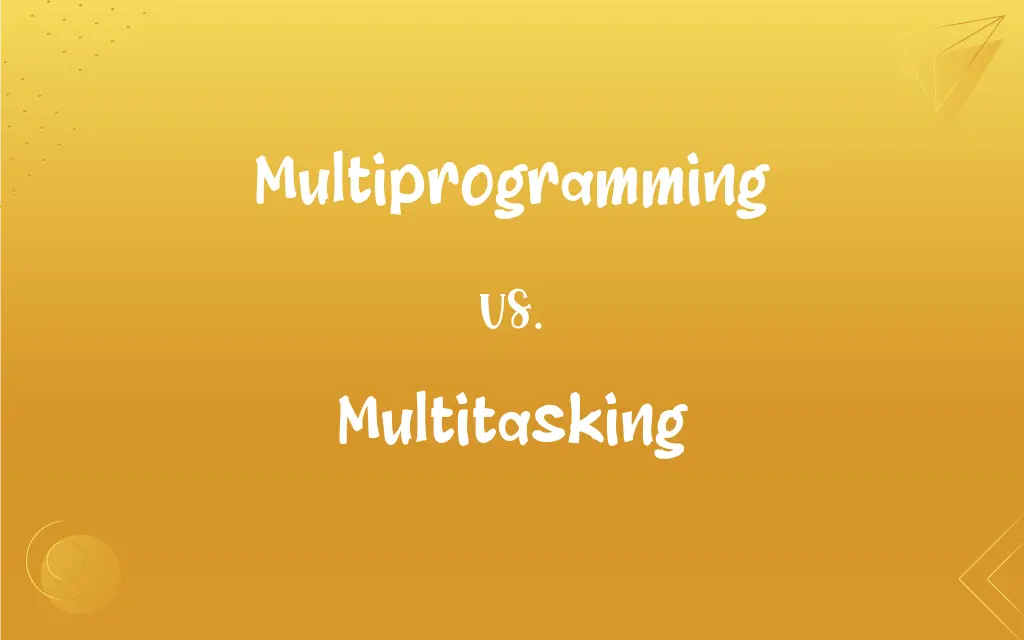Multiprogramming vs. Multitasking: What's the Difference?
Edited by Aimie Carlson || By Janet White || Published on February 1, 2024
Multiprogramming involves multiple programs running on one CPU, managed by the OS for efficiency. Multitasking involves executing multiple tasks simultaneously by rapidly switching focus.

Key Differences
Multiprogramming is a method where multiple programs are loaded into memory and executed by the CPU, but only one at a time. In contrast, multitasking refers to the ability of an operating system to manage multiple tasks by rapidly switching between them, giving the illusion of parallelism.
In multiprogramming, while one program waits for I/O operations, another program can use the CPU. This maximizes CPU usage. Conversely, multitasking divides CPU time between tasks, ensuring that system resources are efficiently utilized and responsive to user input.
Multiprogramming is focused on maximizing CPU utilization by handling multiple programs. Multitasking, however, aims to ensure a smooth user experience by managing the simultaneous execution of multiple tasks.
Multiprogramming requires sophisticated memory management to handle multiple programs. Multitasking demands an advanced scheduler to efficiently switch between tasks, often based on priority or user interaction.
Multiprogramming is more about resource allocation, ensuring that no CPU cycle goes to waste. In contrast, multitasking is about responsiveness and the seamless operation of multiple tasks, prioritizing user experience.
ADVERTISEMENT
Comparison Chart
Focus
Maximizes CPU usage by running multiple programs.
Manages several tasks for efficient and responsive operation.
CPU Usage
Runs one program at a time, switching when idle.
Rapidly switches between tasks.
Resource Management
Concerned with efficient memory usage.
Prioritizes efficient time-sharing of CPU.
User Experience
Less emphasis on responsiveness to user input.
Prioritizes user interaction and responsiveness.
Technology Need
Requires advanced memory management.
Demands an efficient task scheduler.
ADVERTISEMENT
Multiprogramming and Multitasking Definitions
Multiprogramming
"The technique of running multiple programs on a single processor."
The mainframe used multiprogramming to handle various batch jobs simultaneously.
Multitasking
"Juggling multiple tasks through efficient time-sharing by the CPU."
Multitasking made it possible for the server to handle web requests while performing database transactions.
Multiprogramming
"A method to increase CPU utilization by managing several programs."
Multiprogramming allowed the server to process data while also running a backup.
Multitasking
"A method to manage and execute multiple tasks effectively."
The programmer used multitasking to debug software while compiling another program.
Multiprogramming
"A strategy to enhance throughput by alternating between programs."
By employing multiprogramming, the workstation could perform multiple tasks without noticeable lag.
Multitasking
"The process of managing multiple active processes by an OS."
Multitasking is essential for modern OSes, allowing users to switch between apps seamlessly.
Multiprogramming
"Executing several programs concurrently in a computer system."
Multiprogramming in the 1960s revolutionized computing by introducing efficient resource usage.
Multitasking
"The ability of an operating system to execute multiple tasks simultaneously."
Multitasking on her computer allowed her to edit documents while streaming music.
Multiprogramming
"An operating system capability to handle multiple program execution."
The computer's multiprogramming capability meant it could run a virus scan while compiling code.
Multitasking
"Performing several tasks concurrently by rapid task switching."
With multitasking, the smartphone could handle GPS navigation and music playback at the same time.
Multiprogramming
(computing) The allocation of computing resources to more than one concurrent application, job, or user.
Multitasking
The concurrent operation by one central processing unit of two or more processes.
Multiprogramming
The execution of two or more computer programs by a single computer
Multitasking
The engaging in more than one activity at the same time or serially, switching one's attention back and forth from one activity to another.
Multitasking
Present participle of multitask
Multitasking
(computing) The simultaneous execution of multiple tasks (programs) under the control of an interrupt-driven operating system.
Multitasking
The practice or capability of handling more than one task at the same time.
FAQs
Can multitasking occur on single-core processors?
Yes, multitasking can occur on single-core processors through rapid task switching.
Is multiprogramming the same as parallel processing?
No, multiprogramming involves one CPU managing multiple programs sequentially, not in parallel.
How does multitasking work?
Multitasking works by the OS rapidly switching between tasks, effectively managing multiple operations simultaneously.
What's a key benefit of multiprogramming?
A key benefit of multiprogramming is maximized CPU utilization, reducing idle time.
What role does the OS play in multiprogramming?
The OS in multiprogramming manages memory and program execution for efficient resource use.
Do modern operating systems use multiprogramming?
Yes, modern operating systems use multiprogramming to efficiently manage multiple programs.
What is multiprogramming?
Multiprogramming is running multiple programs on one CPU, managed by the OS to enhance efficiency.
Is multitasking essential for modern computing?
Yes, multitasking is essential for modern computing for a responsive and efficient user experience.
Can multiprogramming lead to resource conflicts?
Yes, multiprogramming can lead to resource conflicts if not managed properly by the OS.
Can multiprogramming improve system throughput?
Yes, multiprogramming can improve system throughput by reducing CPU idle time.
How does multitasking affect battery life in mobile devices?
Multitasking can drain battery life faster in mobile devices due to increased processor and resource usage.
Does multitasking affect system performance?
Yes, multitasking can affect performance, especially if the system resources are limited.
Can multiprogramming and multitasking coexist?
Yes, multiprogramming and multitasking often coexist in modern operating systems to optimize efficiency and user experience.
Is multitasking always efficient?
Multitasking is generally efficient but can be less so if too many tasks overload the system resources.
Does multitasking require special hardware?
Multitasking doesn't require special hardware but benefits from multi-core processors for better performance.
How does multitasking impact user experience?
Multitasking enhances user experience by allowing smooth operation of multiple tasks simultaneously.
What's the difference between multiprogramming and multitasking?
Multiprogramming focuses on running multiple programs efficiently, while multitasking manages several tasks at once for responsiveness.
How does multiprogramming affect memory usage?
Multiprogramming can increase memory usage as multiple programs are loaded simultaneously.
Can multitasking lead to system crashes?
If poorly managed, multitasking can lead to system overloads and potentially crashes.
Are there limitations to multiprogramming?
Yes, limitations to multiprogramming include memory capacity and the efficiency of the OS's management.
About Author
Written by
Janet WhiteJanet White has been an esteemed writer and blogger for Difference Wiki. Holding a Master's degree in Science and Medical Journalism from the prestigious Boston University, she has consistently demonstrated her expertise and passion for her field. When she's not immersed in her work, Janet relishes her time exercising, delving into a good book, and cherishing moments with friends and family.
Edited by
Aimie CarlsonAimie Carlson, holding a master's degree in English literature, is a fervent English language enthusiast. She lends her writing talents to Difference Wiki, a prominent website that specializes in comparisons, offering readers insightful analyses that both captivate and inform.































































